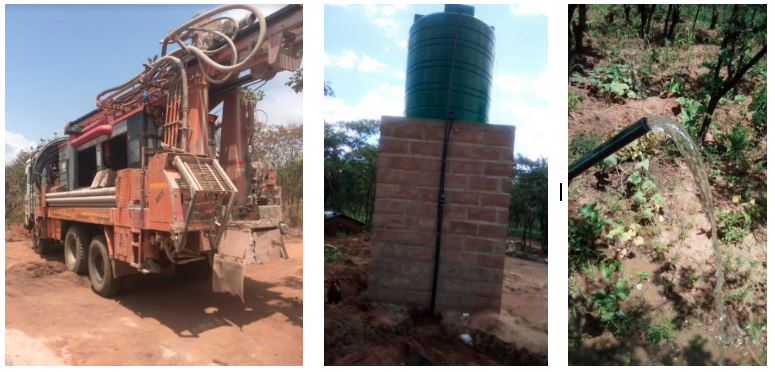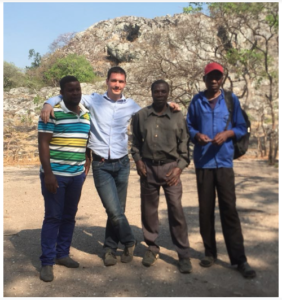2018 has been a very busy year for us: in Zambia, we installed a borehole with a tank and solar pump, extended the plot, dug the foundation for the prospected classroom- and workshop spaces and supervised a student researching the potential of heritage based tourism in the area. In the Netherlands, we worked hard on creating a community food forest, i.c.m. Mobile Orchards. Together, we hope to document existing knowledge, become more self reliant, create healthy communities and foster new knowledge.
Solar borehole, Chilonga
In 2018, we reached a major milestone by managing to drill a borehole, and installing a solar pump to use it. Though the drilling of the borehole went well once we found the right people, getting the solar pump proved to be rather nerve wrecking. At the time, there seemed to be only two companies providing solar pumps, both based in Lusaka. After giving one of those a significant downpayment to order the equipment and prepare installation of the entire package, the company seemed to be so overwhelmed with assignments that they could not keep up with demand. Eventually, they did supply us with a suitable pump and part of the solar installation, but we had to complete and install it ourselves. In the end, putting the solar driven borehole has cost us much more time and money than we expected, but we do now have a solar pump that has been running perfectly since it was installed, serves as an example and does not generate any petrol, fumes or electricity bills.
To create some storage capacity and get enough pressure on the water, we have also installed an elevated tank, and placed it on an a platform that can carry the burden of a 2500 liter tank. Practically, building such a heavyload tankhouse meant turning hollow bricks upside down, and filling them up with steel and cement. Once the cement was set, we could put the tank in place.
To cope with the extra expenses, we managed to get some extra donations. In addition, we collaborated with the neighbours that are letting Kambisa! use their land. They helped us finish the project, and will be allowed to use the water when they need it.

Consultations with local authorities
In consultation with the headman, the Chilonga water committee and semi and non-skilled community members, we were able to further tailor-design the type of projects to be executed in Chilonga. We have discussed what needs to be done first and how the local community is going to be involved in the running of the community centre.
Extension of the plot
After drilling the borehole, the village headman of the Chintutuma village in Chilonga extended the plot we are working at. With this extension, Kambisa! shifted about 50 meters to get a little bit more space for its community centre plans. We now have a space measuring nearly 50mx50m, directly adjoining the road. On this plot we hope to construct the community centre: the classrooms and workshop area, a nursery and demonstration gardens.
Workshops and classroom
As we had not manage to raise the enough money by the time we reached Chingola, we needed to delay and improvise the building of the the classroom and workshop spaces (originally budgeted at 8.200 euro). However, we managed to clear the prospected space and dig the foundation (roughly 8×12 m.).
To cope with the delay, we have decided to build these facilities in phases, depending on the resources we have at the time. From 2019 onward, we hope to start with a smaller covered area (roughly 3.7 x 8m), that can double as an office, storage space, theatre and workshop space. As long as we are lacking a dedicated classroom, we can use the insaka (traditional open gathering room) that is being put up at the neighbours place, so that we can make a modest start with the first activities – even if the foreseen structures are not in place yet. You can read more about the overall project plan.
Tourism student researching Muchinga’s tourism potential
In August 2018, Yves Nix, a student from the Tourism College in Breda (The Netherlands) joined us. To conduct a study on the potential of sustainable heritage based tourism in Muchinga region, he did his field research in Chilonga. With this study Yves has managed to provide us some insight into the tourism potential of the Chilonga area, and the way Kambisa! could tap into that. In 2019, we hope to get the first study results.
Starting 2019, we hope to host more students who will document the rich history and biodiversity of the Muchinga area, or who want to document local knowledge and study topics that are relevant for its people. If you are interested in joining our research plan or if you have a relevant research assignment yourself, please get in touch!
Community food forest Zoetermeer
In the Netherlands, we partnered with MobileOrchards, which is aiming to establish a community food forest between the Hague and Zoetermeer. With this project, we aim to combine the preservation of edible species and local knowledge with the production of new knowledge, local, healthy food, increased self reliance and stronger social ties between those using the forest. We shared publicity, knowledge and time, there were no costs involved. You can read more about the community food forest in our updates, or at mobileorchards.com.
[pdf-embedder url=”https://kambisa.org/wp-content/uploads/2015/03/Jaarstukken-2018.pdf” title=”Jaarstukken – 2018″]

